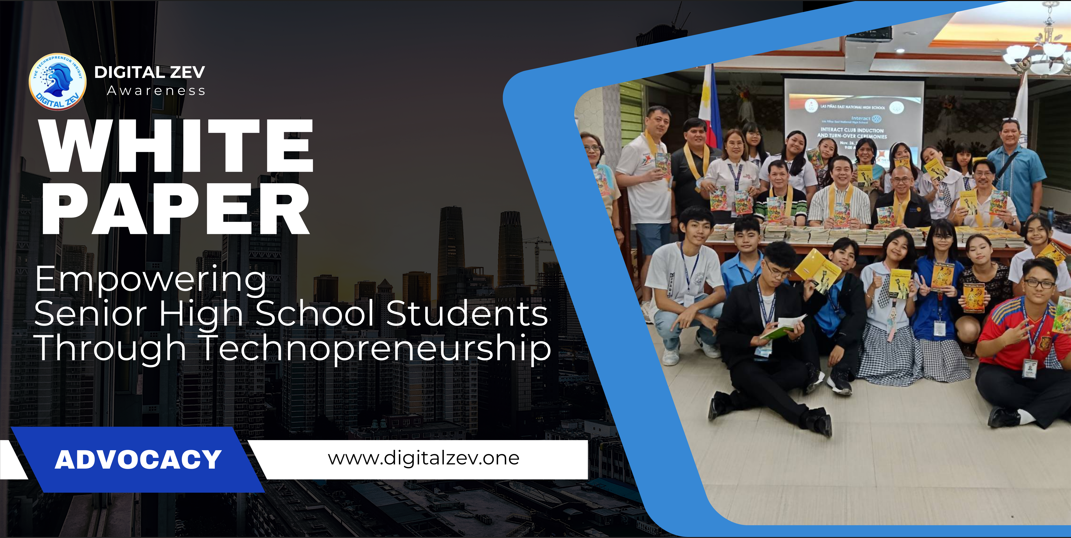
Introduction
Technopreneurship is the art of leveraging technology and innovation to create entrepreneurial ventures that solve real-world problems. Exposing senior high school students to technopreneurship equips them with future-ready skills, inspires innovative thinking, and fosters economic growth. Rotary Clubs, with their commitment to service and community development, have a unique opportunity to champion this initiative. This whitepaper outlines the significant impacts of introducing technopreneurship to senior high school students and its alignment with Rotary’s 7 Areas of Focus.
Impact of Technopreneurship on Key Stakeholders
1. Rotary District and Proposing Club
- Enhanced Community Engagement:Â By spearheading technopreneurship programs, Rotary Clubs strengthen their connection with schools, local businesses, and government agencies.
- Increased Membership Appeal:Â Showcasing impactful projects attracts new members, especially professionals from the technology and education sectors.
- Leadership in Innovation:Â Rotary Clubs position themselves as pioneers in promoting 21st-century skills, enhancing their reputation for forward-thinking service.
2. Schools
- Curriculum Enrichment:Â Technopreneurship introduces real-world applications, making learning more relevant and engaging for students.
- Improved Student Outcomes:Â Students gain entrepreneurial and technological skills, boosting their employability and readiness for higher education.
- Community Collaboration:Â Schools benefit from partnerships with Rotary Clubs, local industries, and technopreneurs who serve as mentors.
3. Society
- Empowered Youth:Â Students with technopreneurial skills can create solutions that address community challenges.
- Stronger Communities:Â Programs promote collaboration among stakeholders, fostering a culture of innovation and mutual support.
- Social Innovation:Â Projects often focus on addressing societal issues like education gaps, environmental sustainability, or economic disparities.
4. Economy
- Job Creation:Â Student-led startups generate employment opportunities within local communities.
- Economic Growth:Â Technopreneurial ventures stimulate innovation, attract investments, and diversify local economies.
- Global Competitiveness:Â By fostering a culture of innovation, regions gain a competitive edge in the global market.
Alignment with Rotary’s 7 Areas of Focus
Technopreneurship aligns seamlessly with Rotary’s mission and serves multiple Areas of Focus:
- Basic Education and Literacy:Â Enriching education by integrating entrepreneurship and technology.
- Economic and Community Development:Â Fostering innovation to boost local economies and create sustainable jobs.
- Maternal and Child Health:Â Developing tech solutions for healthcare access and awareness.
- Disease Prevention and Treatment:Â Promoting health-focused technologies.
- Water, Sanitation, and Hygiene:Â Encouraging projects that address water sustainability and sanitation.
- Supporting the Environment:Â Empowering students to create green technologies and sustainable solutions.
- Peace and Conflict Prevention/Resolution:Â Building resilient communities through inclusive economic opportunities.
Proposed Actions for Rotary Clubs and Districts
1. Partnership with Schools
- Collaborate with educational institutions to integrate technopreneurship into the curriculum.
- Facilitate workshops, hackathons, and mentorship programs for students.
2. Establish Technopreneurship Hubs
- Create spaces equipped with technology and resources for students to develop their ideas.
- Partner with local businesses, universities, and tech professionals to provide guidance.
3. Launch Recognition Programs
- Celebrate student achievements through awards, scholarships, and public showcases.
- Highlight successful projects in Rotary events and publications.
4. Engage the Community
- Encourage local businesses to support student-led ventures through funding or internships.
- Foster a culture of innovation by hosting community-wide events focused on technopreneurship.
Conclusion
Investing in technopreneurship for junior high school students offers transformative benefits for Rotary Clubs, schools, society, and the economy. By aligning this initiative with Rotary’s 7 Areas of Focus, clubs can drive sustainable change while inspiring the next generation of innovators and leaders.
Let’s empower students today to build a better, more innovative tomorrow. Together, we can make a lasting impact on communities and beyond.
Call to Action
Rotary leaders, let’s champion technopreneurship in our districts. Reach out to schools, initiate partnerships, and inspire young minds to innovate. Together, we can create a brighter, more sustainable future for all.


 Previous Post
Previous Post Next Post
Next Post